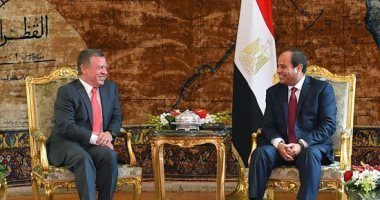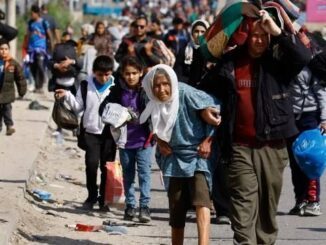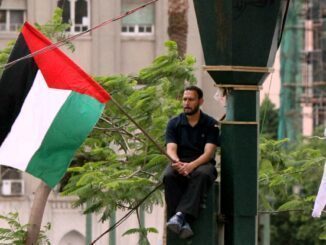
On August 24, King Abdullah of Jordan led a large delegation to Cairo where he met Abdel Fattah al-Sisi to discuss the situation in Syria and Iraq, the danger of Islamic State, the U.S. presidential elections, the peace process and other developments in the Middle East.
However, another main topic was on the top agenda of King Abdallah and al-Sisi’s talks which is” the Palestinian arena and particularly the municipal elections for October 8, 2016, in the West Bank and Gaza,” said Jerusalem Center for Public Affairs (JCPA).
In fact, Jordan backs the Egyptian initiative to convene talks between Israel and the Palestinians. According to Jordanian sources, “Abdullah believes that only Egypt is capable of reconciling rival Palestinian factions within the dominant Fatah organization.” Accordingly, it would be a source of success to the Egyptian initiative’s if it enabled the Palestinians to present a unified diplomatic position in future negotiations with Israel.
However, what really concerned al-Sisi and Abdullah in their meeting was that “Hamas might win the upcoming local elections, meaning that its power would spread from Gaza to the West Bank as well,” said the JCPA.
Moreover, if Hamas succeeded in strengthening its power in the West Bank, this could have dangerous implications on the Hashemite Kingdom’s stability where elections are scheduled for September 20, 2016. It is noteworthy that Hamas has strong ties with the Muslim Brotherhood in Jordan, where its political arm, the Islamic Action Front (IAF), is a major opposition force in Jordan.
In this context, JCPA said that Hamas constitutes a major danger in both countries and the last meeting between Abdullah and al-Sisi was to negotiate the possible ways to face this upcoming threat.
Regarding Jordan, the newspaper Rai al-Youm reported on August 27 that Jordan had rejected messages conveyed by Khaled Mashal, chairman of Hamas’ Political Bureau, that were meant to soften its stance toward Hamas in the context of the local elections in the territories.
Egypt, too, fears the possible strengthening of Hamas Resistance Movement as a regional force due to its close ties with the Egyptian Muslim Brotherhood, Turkey and Qatar. All of these actors represent a direct threat to the al-Sisi regime.
As a result, both Egypt and Jordan fear the strengthening of Hamas and its possible victory in the West Bank local elections “because of the deep division within the Fatah organization and, particularly, the unbridgeable disputes between the faction headed by Muhammad Dahlan and the one headed by Palestinian Authority Chairman Mahmoud Abbas.”
“Hence, in an extremely irregular fashion, al-Sisi and Abdullah issued a joint statement on the importance of the Palestinian problem and the need to achieve unity and resolve the disputes within Fatah itself,” said the Israeli Research Center.
The statement reflects the Egyptian-Jordanian order of priorities: first reconciliation within Fatah to cut off the way for Hamas victory in elections and only afterward the reconciliation between Fatah and Hamas.
The JCPA said that statement should indeed called on Abbas to fix fences with his bitter rival Dahlan so that Fatah can run in the elections in a unified form and prevent a Hamas victory.
In fact, this is not the first time al-Sisi has asked Abbas to mend his differences with Dahlan, but it was rejected because Fatah Central Committee opposes reconciliation.
However, it seems that King Abdullah has added his voice to al-Sisi demand ahead the upcoming possible Hamas victory in the elections.
Dahlan, who resides today in Dubai, has good relations with both al-Sisi and Abdullah, and both of them would like to see him as PA chairman after the 81-year old Abbas retires from political life.
In response to the joint statement of the al-Sisi and King Abdullah, Abbas was to issue a statement of the Fatah Central Committee with a similar message. It calls for the unification of all members of the movement under the Fatah umbrella, “in a way that will serve the Palestinian problem and the overall Palestinian situation in light of the delicate stage at which the Palestinian problem exists at the moment, a reality that requires the unification of the ranks….”
In the same context, Muhammad Dahlan’s associates, headed by his right-hand man Samir al-Masharawi, welcomed both the joint statement of al-Sisi and Abdullah as well as the statement of the Fatah Central Committee.
However, “It quickly emerged that the statement of the Abbas-led Fatah Central Committee was no more than lip service.”The PA chairman has no intention to reconcile with his rival enemy Muhammad Dahlan.
On August 25, 2016, the newspaper Al-Quds al-Arabi reported that Abbas was working to improve his relations with Jordan and that in his recent meetings there he called his ties with the Jordanian leadership “excellent” and says “he does not hide anything from King Abdullah.”
Abbas’ relations with al-Sisi are tense because of Abbas’ opposition to the Egyptian initiative and refusal to bury the hatchet with Dahlan.
Accordingly, the statement of the Fatah Central Committee could be aimed at placating al-Sisi and Abdullah. But in reality nothing has changed and Abbas remains determined to hold the elections notwithstanding Fatah’s weakness and calls by senior members of the movement to postpone them.
As a result, the tension and competition between Fatah-Hamas are growing on the ground especially as the propaganda war is intensifying as well.
Abbas is passing through hard times overcoming his personal sentiments and his hatred for Dahlan.”If in the coming weeks, no real change occurs in Abbas’ disposition toward the elections issue or toward reconciling with Dahlan, it appears that Hamas’ chances to win the elections will indeed be increasing,” said JCPA.



